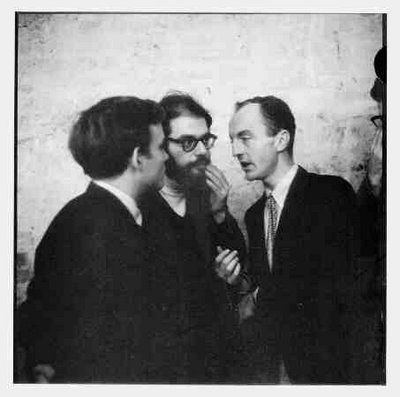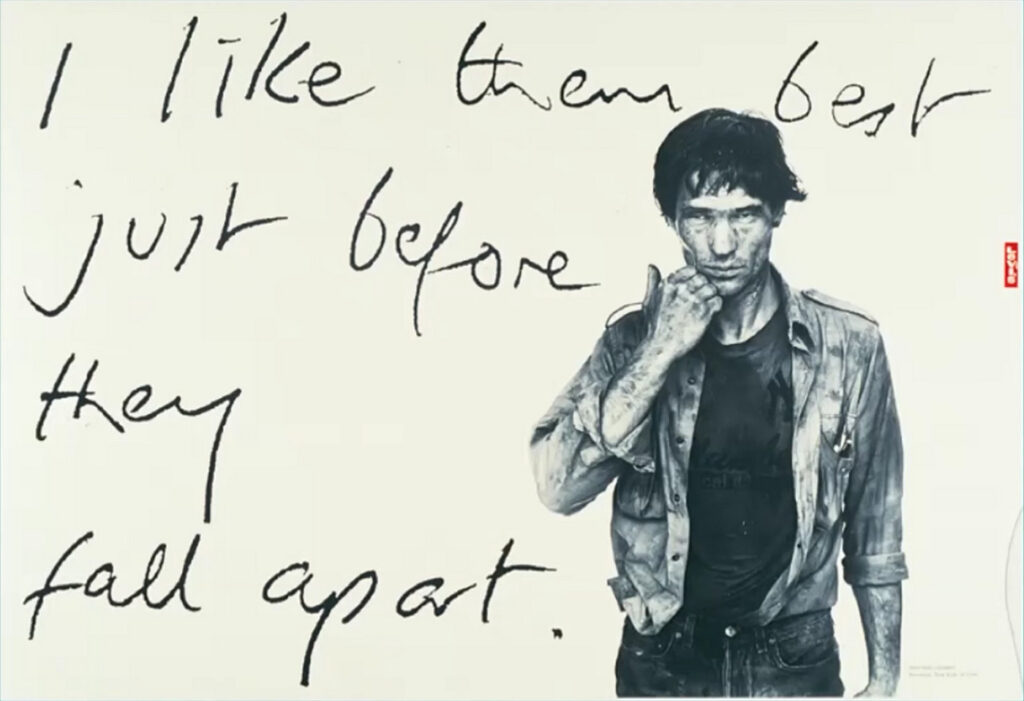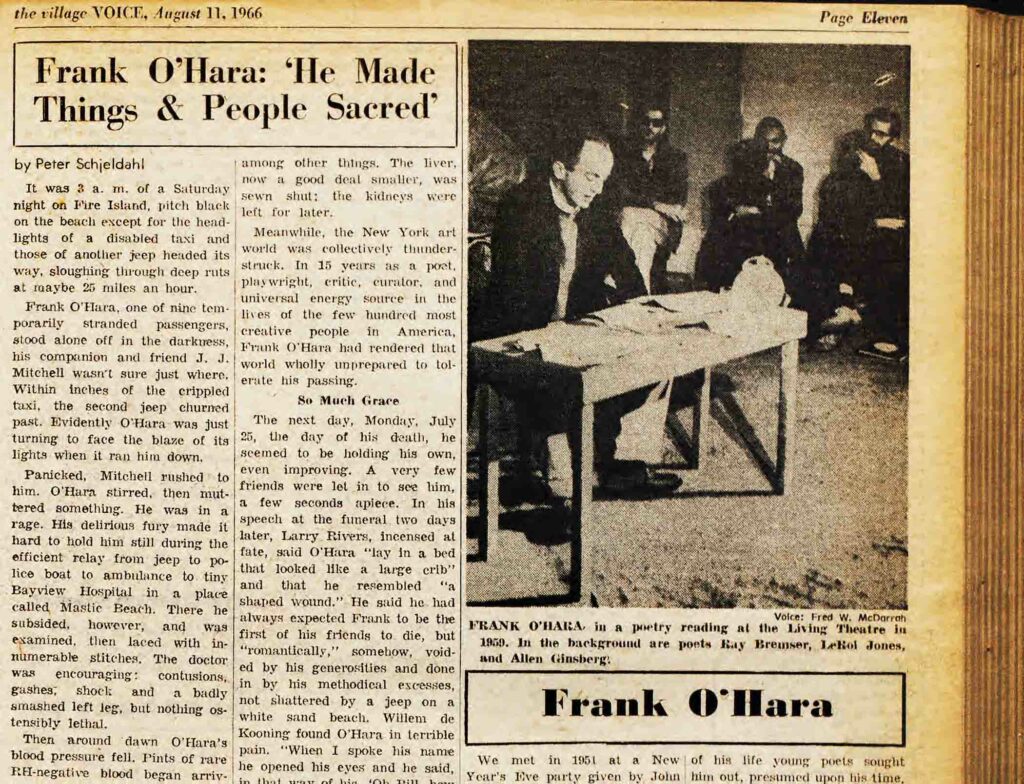
Make the mundane sacred
Frank O’Hara wrote hundreds of poems during a short life of just 40 years.
He’d write in bars, at parties, and on the Staten Island Ferry (on the way to a reading, no less).
And most of his art was an expression of love.
His obituary appeared in the Village Voice in 1966 with the title “He Made Things & People Sacred”.
There’s a lesson in there. Let’s find it.
Lunch was the poet’s favourite meal
Last Friday, I sat in a park surrounded by skyscrapers, with a friend and a fat sandwich. Five lines came to mind, so I slapped them into a note-taking app:
Canary Wharf persuades you
People can get busy in all directions,
But the woman cramming bagels,
Wedging salt beef between gherkins,
She points directly – right through.
After writing that, I thought of Frank O’Hara for the rest of the afternoon. He knew loving attentiveness was the best stance for a creative person to take. And I was trying.
Frank O’Hara ate liver sausage sandwiches
He ate avocado salad. Sometimes he made do with “just plain scrambled eggs”. Other times he stopped for “cheeseburgers at JUILET’S CORNER”.
We know about his diet because he wrote poems during his lunch break. For an hour, he’d abandon his job at the Museum of Modern Art and take in the city he adored.
The metropolis made him lift his eyes to glass towers and think:
And here I am, the
center of all beauty!
writing these poems!
Imagine!
In New York, there were people
And that meant there was constant news, debate and gossip. Lots of which made its way into O’Hara’s work.
In fact, any thought that flitted across O’Hara’s mind might be folded into a ‘Lunch Poem’. He’d ingest the cabs, workmen and street signs, then punch the experiences onto paper using “a sample Olivetti”.

We’ve already hinted at O’Hara’s secret
His secret. The reason he could be incessantly creative. It was some Big Apple combo of love, people, and attention that kept O’Hara writing.
Here’s how a critic called George Acocella put it:
“For O’Hara, the magic formula, the thing that liberated his personality and his poetry, was the mixing of art with friendship. When he finally came into his own, all his friends were artists, and their friendships were about art. Conversely, his poetry was full of his friends, and about their friendship.”
O’Hara even invites pals into his manifesto
People debate how serious the manifesto titled Personism really is. But it reads like classic O’Hara. The movement was:
“… founded by me after lunch with LeRoi Jones on August 1959, a day in which I was in love with someone (not LeRoi, by the way, a blond).”
Central beliefs include: poetry should be “between two people instead of two pages”, and comparable to a phone call. The desired style was casual, meandering, intimate.
Intimate thoughts lead to creative thinking
Write like you’re talking to the object of your desire…
It isn’t bad advice, you know. There’s some semblance of scientific evidence for it.
Here’s an experiment from the Netherlands: psychologists asked a group of young people to imagine taking a long walk with their beloved. They then had to answer a series of brain-teasers.
There was a measurable effect. Thinking about a romantic partner stimulated ‘global processing’ mechanisms in the brain, which increased long-term focus and creativity.
Now, turn back to Lunch Poems and you can almost see the lenses switching. O’Hara takes the long view at the end of “A Step Away From Them”:
There are several Puerto
Ricans on the avenue today, which
makes it beautiful and warm. First
Bunny died, then John Latouche,
then Jackson Pollock. But is the
earth as full as life was full, of them?
Rule one: never become a cynic
It tickled me to learn Frank O’Hara’s poems appear in Mad Men, because I wanted to quote a modern master of advertising: Sir John Hegarty.
Hegarty has been in the biz since our subject was pacing the streets of New York. So we should listen to his rules for lengthening your career as a creative.
“The first is never become a cynic. Cynicism is the death of creativity. The belief in your idea and the belief that it can make the world a better place is crucial to your inspiration. Doubt undermines belief, but cynicism kills it stone dead.”
That’s Sir John talking. But it could just as well have been David Foster Wallace. The author had real concerns about the corrosive creep of irony in American culture.
“Postmodern irony and cynicism’s become an end in itself, a measure of hip sophistication and literary savvy. Few artists dare to try to talk about ways of working toward redeeming what’s wrong, because they’ll look sentimental and naive to all the weary ironists.”
Cynicism and irony reveal problems, sure. But only love and hope provide solutions.

Besides, it’s a better way to live (and die)
It’s strange to be shocked by a death that happened long ago. But it was only while pulling together thoughts for this blog post that I learnt of O’Hara’s tragic end.
Still, the words offered up at his funeral tell me everything I need to know. O’Hara’s was a life well lived. Larry Rivers said, “Frank O’Hara was my best friend. There are at least sixty people in New York who thought Frank O’Hara was their best friend.”
How can you top that for a last word ? I can’t, really. So I’ll leave you with the unhip, sincere, hopeful lessons I draw from Frank O’Hara.
The more you write, the more you’ll have to say.
The more attention you bring to the world, the more fascinating it becomes.
The more love you give away, the more you’ll have – now and when you pass into memory.



